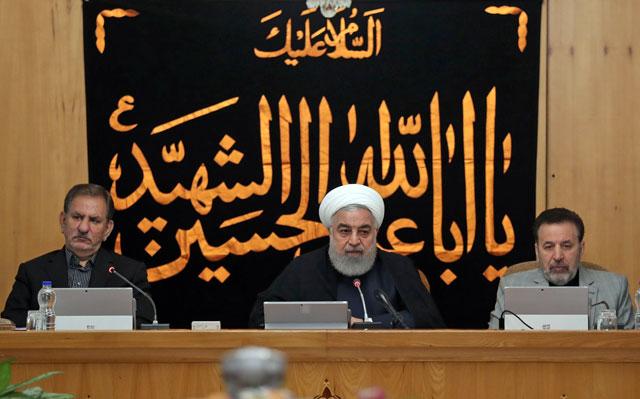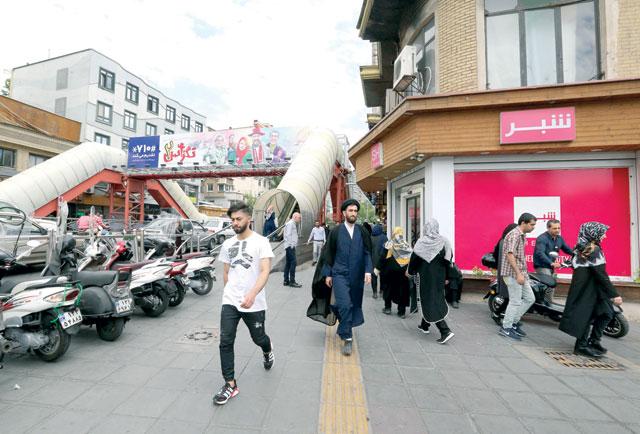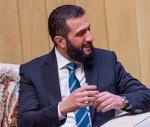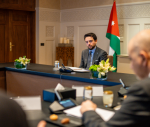You are here
Iran rules out direct US talks
By AFP - Sep 03,2019 - Last updated at Sep 03,2019

Iran's President Hassan Rouhani (centre) arrives to address parliament in the capital Tehran on Tuesday (AFP photo)
TEHRAN — President Hassan Rouhani on Tuesday ruled out holding any bilateral talks with the United States and threatened to further cut Iran's commitments to a nuclear deal within days.
Iran and three European countries — Britain, France and Germany — have been trying to save the landmark agreement reached in 2015 and meant to limit Tehran's nuclear programme after the US pulled out last year.
But French Foreign Minister Jean-Yves Le Drian cautioned that several issues were still hindering their efforts.
"There is still lots to work out. It's still very fragile," Le Drian told journalists in Paris.
France has been leading efforts for dialogue, with President Emmanuel Macron expressing hope during G-7 talks in late August of organising a meeting between Rouhani and US President Donald Trump.
However, in a speech to Iran's parliament on Tuesday, Rouhani said any dialogue with the US would have to fall within the framework of the six major powers that agreed the nuclear deal.
"Maybe there has been a misunderstanding. We've said it several times and we repeat it — there has been no decision to hold bilateral talks with the US," said the Iranian president.
"In principle, we don't want bilateral talks with the United States," he told lawmakers.
"If the United States lifts all sanctions... it would be possible to talk [to them] during 5+1 meetings as in the past," Rouhani said, referring to the powers involved in negotiating the 2015 deal.
"We have received several proposals [to have talks with the United States] and our answer has always been negative."
Tehran and Washington have been at loggerheads since May 2018 when Trump unilaterally withdrew the US from the nuclear deal and began reimposing crippling sanctions.
The arch-foes were on the cusp of confrontation in June when Iran downed a US drone and Trump ordered retaliatory strikes before cancelling them at the last minute.
Iran has riposted by scaling back its nuclear commitments in response to the US withdrawal from the deal, which gave it the promise of relief from sanctions in return for curbs on its atomic programme.
It has already increased its uranium enrichment and stockpiles, and Rouhani said Tuesday a “third step will be enacted in the coming days” unless the remaining parties to the deal honour their own commitments.
“If by Thursday these negotiations yield no results, we will announce the third step of the reduction of our commitments,” he said.
On Friday, the International Atomic Energy Agency said just over 10 per cent of Iran’s uranium stockpile was enriched to 4.5 per cent, above the 3.67 per cent limit stipulated in the 2015 deal.
The UN watchdog said Iran’s total stockpile of uranium, which under the accord should be no more than the equivalent of 300 kilogrammes of uranium hexafluoride, stood at roughly 360 kilogrammes.
But Rouhani stressed the Iranian countermeasures were reversible.
“Our steps have been taken in such a way that it doesn’t take much time to get back to the starting point,” he said.
Rouhani voiced regret over the failure of European governments to fulfil pledges they made during negotiations.
“Unfortunately after the US betrayal... the Europeans haven’t acted on their commitments or couldn’t... in some cases they could have acted but did not,” he said.
“What we are asking of the other countries is that they continue to buy our oil.
“We can continue negotiations even after the third step,” he added.
Rouhani has had a series of phone calls with Macron in recent weeks aimed at salvaging the nuclear deal.
The French president has been trying to convince the United States to offer Iran some sort of relief from sanctions it has imposed on the Islamic republic since pulling out of the agreement.
A conservative Iranian lawmaker said Macron had proposed offering Iran a $15-billion credit line on condition it returns to the fold.
“Macron has proposed Iran stop its third step for now in exchange for this sum, and maybe retreat from its first and second steps to the initial situation,” said Ali Motahari, quoted late Sunday by Iran’s Tasnim news agency.
The 2015 deal was brokered between Iran and the so-called 5+1 — UN Security Council permanent members Britain, China, France, Russia and the United States plus Germany.
Related Articles
TEHRAN — Iran warned Britain's next prime minister Boris Johnson on Tuesday that it will "protect" waters of the oil-rich Gulf, amid a stand
TEHRAN — President Hassan Rouhani said Iran will announce a new step in scaling back its nuclear commitments by Thursday despite a
BERLIN — European countries said on Thursday they wanted to preserve Iran's nuclear deal and rejected "ultimatums" from Tehran, after Iran s


















